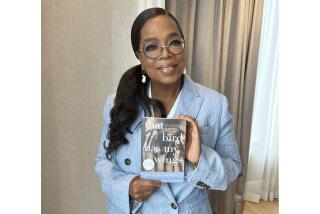Conviction stands in ’93 arson murder
A state prison inmate who inserted himself into the decade-old mystery surrounding the slaying of rap star Biggie Smalls with conflicting claims about who was behind the killing lost his bid to overturn his own murder conviction Wednesday when a judge ruled that his alibi was “entirely unbelievable.”
Waymond Anderson, 43, contended that he was wrongly convicted of a 1993 arson murder in South Los Angeles because he was in Mississippi at the time of the killing. But Los Angeles County Superior Court Judge William C. Ryan denied Anderson’s request for a new trial, finding that the former R&B; singer provided “too little, much too late” to support his assertion that he was out of state when the killing took place.
Ryan cited four 1994 interviews in which Anderson repeatedly told Los Angeles police detectives he was in Compton around the time of the murder and had overheard plans by the real assailants to carry out the attack. Anderson testified earlier this year that police had encouraged him to lie and that in reality he had not been able to recall where he was the day of the killing.
“This court finds it totally incredible that the defendant would not be able to state that he was in Mississippi . . . when he was interviewed by the police after being arrested,” Ryan wrote in his 32-page opinion. “Besides his obvious bias and motive to lie now, he is an admitted perjurer.”
Prosecutors said they welcomed the ruling.
“The evidence that was presented in court was overwhelming that he was guilty,” said Deputy Dist. Atty. Laura Jane Kessner.
Anderson’s attorney could not be reached for comment.
The decision marks the second time Anderson’s wrongful-conviction claims have been rejected. In 2002, another judge accused Anderson and his supporters of trying to fabricate evidence and “perpetrate an elaborate and audacious fraud upon the court.”
Anderson, who had a nationwide hit in the 1980s with an updated version of the Motown standard “My Girl,” was convicted in 1997 of torching a drug users’ hangout near USC and setting a man aflame to avenge an unpaid drug debt.
But it was his allegations implicating a rogue LAPD officer in the unsolved 1997 slaying of rapper Christopher Wallace, also known as Notorious B.I.G., that brought him the most attention.
Anderson had previously told LAPD investigators that former LAPD Officer Rafael Perez had come to his cell in 1997 after the Wallace shooting and threatened him if Anderson gave detectives information about the killing.
But last year, he recanted the claim during a deposition in a civil suit brought by Wallace’s family against the city of Los Angeles.
This summer, however, while testifying in his own case, Anderson recanted his recantation. He implicated Perez and another disgraced former LAPD officer, David Mack, in the shooting.
Anderson testified that he had lied at the deposition because he had received threats from a rap producer that were passed to him by Chuck Philips, a former Los Angeles Times reporter. Philips, who had written a front-page story about Anderson’s claims of innocence, denied the allegation.
--
More to Read
Sign up for Essential California
The most important California stories and recommendations in your inbox every morning.
You may occasionally receive promotional content from the Los Angeles Times.











